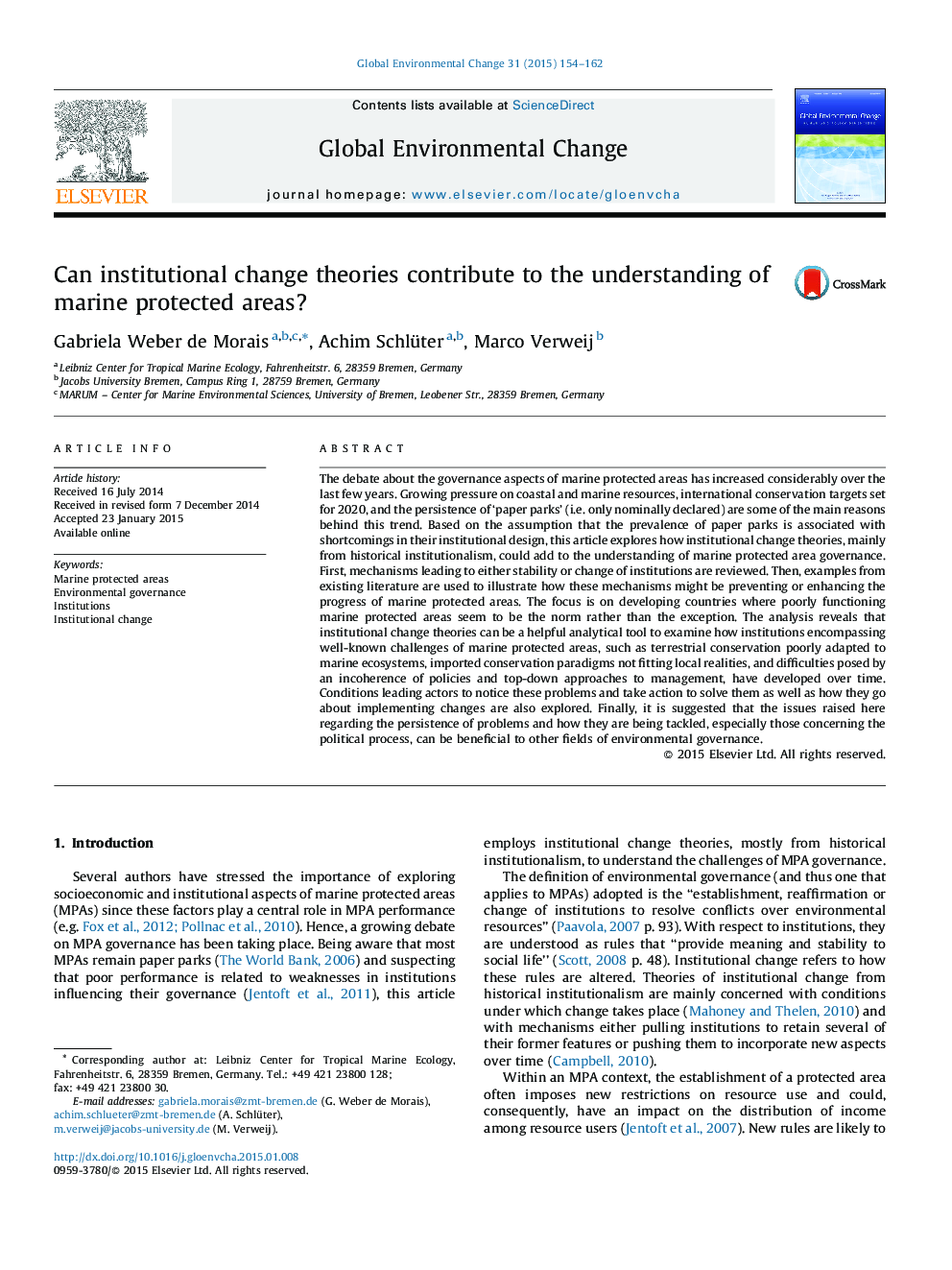| کد مقاله | کد نشریه | سال انتشار | مقاله انگلیسی | نسخه تمام متن |
|---|---|---|---|---|
| 7470069 | 1485127 | 2015 | 9 صفحه PDF | دانلود رایگان |
عنوان انگلیسی مقاله ISI
Can institutional change theories contribute to the understanding of marine protected areas?
ترجمه فارسی عنوان
آیا نظریه های تغییر نگرش در درک مناطق حفاظت شده دریایی کمک می کنند؟
دانلود مقاله + سفارش ترجمه
دانلود مقاله ISI انگلیسی
رایگان برای ایرانیان
کلمات کلیدی
مناطق حفاظت شده دریایی، حکومتداری محیط زیست، موسسات، تغییرات سازمانی،
ترجمه چکیده
بحث در مورد جنبه های حاکمیت مناطق حفاظت شده دریایی طی چند سال گذشته قابل توجه است. فشارهای فزاینده ای بر منابع ساحلی و دریایی، اهداف حفاظت بین المللی برای سال 2020 و همچنان "پارک های کاغذی" (یعنی فقط اعلام اسامی) یکی از دلایل اصلی این روند است. بر اساس این فرض که شیوع پارک های کاغذی با کاستی هایی در طراحی سازمانی آنها همراه است، این مقاله به بررسی اینکه چگونه نظریه های تغییر نهادی، عمدتا از طریق نهادگرایی تاریخی، می تواند به درک اداره حوزه های حفاظت شده دریایی اضافه شود. اول، مکانیزم هایی که منجر به ثبات یا تغییر موسسات می شوند بررسی می شود. سپس، نمونه هایی از ادبیات موجود برای نشان دادن چگونگی جلوگیری یا پیشرفت این مکانیزم ها در پیشرفت مناطق حفاظت شده دریایی استفاده می شود. تمرکز بر روی کشورهای در حال توسعه است که مناطق ضعیف ساحوی دریایی به نظر می رسد که به جای استثنا به عنوان مقررات است. تجزیه و تحلیل نشان می دهد که نظریه های تغییر نهادی می تواند یک ابزار تحلیلی مفیدی برای بررسی اینکه چگونه موسسات شامل چالش های شناخته شده مناطق حفاظت شده دریایی، مانند حفاظت زمینی ضعیف با اکوسیستم های دریایی سازگار، پارادایم های حفاظت وارداتی، منطبق با واقعیت های محلی، و مشکلات ناشی از عدم هماهنگی سیاست ها و رویکردهای بالا به پایین به مدیریت، در طول زمان توسعه یافته است. شرایطی که ذهن بازیگران را متوجه این مشکلات می کند و اقداماتی را برای حل آنها و همچنین نحوه انجام تغییرات انجام می دهند نیز مورد بررسی قرار می گیرند. در نهایت پیشنهاد می شود که مسائل مطرح شده در مورد ماندگاری مشکلات و نحوه رسیدگی به آنها، به خصوص در مورد روند سیاسی، می تواند برای سایر حوزه های مدیریت محیط زیست مفید باشد.
موضوعات مرتبط
علوم زیستی و بیوفناوری
علوم محیط زیست
علوم زیست محیطی (عمومی)
چکیده انگلیسی
The debate about the governance aspects of marine protected areas has increased considerably over the last few years. Growing pressure on coastal and marine resources, international conservation targets set for 2020, and the persistence of 'paper parks' (i.e. only nominally declared) are some of the main reasons behind this trend. Based on the assumption that the prevalence of paper parks is associated with shortcomings in their institutional design, this article explores how institutional change theories, mainly from historical institutionalism, could add to the understanding of marine protected area governance. First, mechanisms leading to either stability or change of institutions are reviewed. Then, examples from existing literature are used to illustrate how these mechanisms might be preventing or enhancing the progress of marine protected areas. The focus is on developing countries where poorly functioning marine protected areas seem to be the norm rather than the exception. The analysis reveals that institutional change theories can be a helpful analytical tool to examine how institutions encompassing well-known challenges of marine protected areas, such as terrestrial conservation poorly adapted to marine ecosystems, imported conservation paradigms not fitting local realities, and difficulties posed by an incoherence of policies and top-down approaches to management, have developed over time. Conditions leading actors to notice these problems and take action to solve them as well as how they go about implementing changes are also explored. Finally, it is suggested that the issues raised here regarding the persistence of problems and how they are being tackled, especially those concerning the political process, can be beneficial to other fields of environmental governance.
ناشر
Database: Elsevier - ScienceDirect (ساینس دایرکت)
Journal: Global Environmental Change - Volume 31, March 2015, Pages 154-162
Journal: Global Environmental Change - Volume 31, March 2015, Pages 154-162
نویسندگان
Gabriela Weber de Morais, Achim Schlüter, Marco Verweij,
